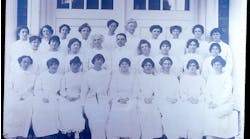By Carol Roszel, RDH, BSDH, CHT
As a hygienist, I often wonder what it feels like to go to the dentist on a routine visit as a patient.
- What do patients feel days or hours before they have to go to the dentist?
- What is their first impression when they walk in the door?
- What are they thinking about when they are in my chair?
- What is the lasting impression that patients leave with?
All of these questions captured my curiosity. Recently, a friend recommended scheduling an appointment with a dentist in my hometown. The office did this "relaxation thing" during their cleaning. She said it felt like a spa appointment -- with a purpose. Her contractor husband chimed in and said he sends all of his employees there for their maintenance visits because they come back to work with a great attitude after their appointments.
I was intrigued. I am not one to seek out trendy pampering, but my friend said it was not like that. The appointment was different; it was the "ultimate dental appointment."
-------------------------------------------------------
Other articles to consider reading:
- 2013 Dental office design competition winners announced
- Ontario's Smile Spa: Independent Canadian hygienist builds practice based on her beliefs
- Holistic approaches to chronic disease: Author describes how the holistic philosophy allowed her to continue healing beyond traditional medicine
-------------------------------------------------------
After talking with them, I scheduled an appointment. Part of my reasoning was that the visit would be an opportunity to investigate a dental office and be the naïve, curious patient. A dental office can be an intimidating and a very scary place. Despite much advancement in the dental profession, dental anxiety is still prevalent. A few areas producing anxiety include:
- Fear of pain and the unknown -- Fear of pain may come from an unexpected touch, and nearly every touch is unexpected. I feel exposed and vulnerable when someone touches my face; I bet patients feel the same. Anticipating the zinger when the hygienist gets to "that" tooth and the dreaded shot contribute to anxiety. Although we call it local anesthetic, it's a shot to them. There's never really a sense of relaxation, even at a dental hygiene appointment.
- Fear of cost or being able to afford dental work -- People express their concern for not being able to afford dental work; therefore, they just don't go. There is a fear of exposing their financial stresses. They will only go if something hurts. I heard stories such as, "When the dentist tells me the cost of my dental needs, I feel bad about myself because I can't afford it. I put it off and then each time I come in, he adds more treatment, or shames me because I wasn't able to pay for my crown and now I need endo, too. It makes me not want to go in for my cleaning appointments because of what I am going to hear."
- Fear of lectures and being talked down to -- We think we are educating them, but all they hear is the repetitive "brush and floss, brush and floss," which can be interpreted as "you're a lazy, uncoordinated mess." We point out that they have not met "our" standards. So we ask them if they have been flossing and how many times a day do they brush. Patients feel that they are being judged.
Have we ever asked them if they are having difficulties with brushing or flossing? "Is there something you find helpful in cleaning your teeth?" Some cancel their appointments or just don't show because they haven't kept up with their flossing and will reschedule when they are flossing better. How many times have we heard, "I started flossing over the weekend because I knew I was coming in to see you"? These answers bothered me because my sad conclusion was that fear overcomes the value of oral health.
Some patients will agonize from the moment they make their appointments. This is one of the reasons for last minute no-shows and cancellations. Anything is "more important" than keeping their dental appointments. What if we could change this paradigm and give patients a reason to look forward to going to the dentist? What would make the patients' maintenance visits a pleasant experience where they knew I cared about their total health? This is what I have control over and where I could actually make a difference in someone's life.
My mission: A positive experience
Sporting my dark glasses, my version of Nancy Drew, I became the new mystery patient in search of the ultimate prophy experience. You never get a second chance at a first impression. And like any patient, I would also be making a judgment at my first impression of this new office. What would I see, hear, smell, and feel when walking into this new dental practice?
As I drove to my appointment, my cynical side started to convince me that this "spa experience" was unnecessary. Were my hands going to be dipped in hot wax, or would someone be massaging me while my teeth were cleaned? I felt annoyed with myself. I have endured childbirth three times and lived through my children's adolescence. I ventured off to hygiene school alone, and allowed dozens of dental freshmen to put their hands in my mouth -- not to mention years of biannual cleanings of revolving hygienists. I am a warrior woman; so what could this new relaxing experience do for me?
When I arrived, though, I was guided into a softly lit operatory. A familiarly pleasant, inoffensive scent filled my nose. Being a highly allergic and sensitive-to-smell kind of gal, I was hoping it would not get any stronger. I found it soothing; my eyes and body immediately felt calm. The operatory was a warm, inviting place that I could get very cozy in.
After the prediagnostic exam, which can often be intimidating, I was instructed to uncross my legs and take three deep breaths. She said it was to open up my Qi (all of the energy channels and blood flow). The stress of the morning rush started to diminish, and another level of deeper relaxation started to come over me. I was covered with a warm blanket, warmed patient bib, and a face pillow that wrapped my TMJ and facial muscles in warmth. The experience continued to unfold.
From an untrained perspective, I might think this was just a relaxing facial massage. My hygiene education alerted me that each touch and movement was well choreographed, purposeful, and I received a comprehensive exam of the entire head, neck, thyroid, face, and oral cavity, checking for any abnormalities. I surely did not learn this level of oral cancer screening in hygiene school!
Being in the proverbial driver's seat, providing and receiving dental care for years, I anticipated a certain amount of pressure and sensitivity that one might experience during a normal prophylaxis. Those anticipations were foiled -- no stretching of the lips or cheeks, not even that gritty texture. I tried to think about what she was doing and what a patient would be thinking. But I couldn't think; I was so relaxed. I just wanted to doze off and not think about anything.
Then, a small thought came through: "If I was doing this prophy, I would be talking to the patient about anything and everything." It was dead calm in this operatory -- silence, a really peaceful place of quiet. I could stay here for the rest of the day, I thought, really liking the environment. I wanted my patients to have this kind of treatment.
When the prophy was finished, I received another more comprehensive screening of the head, neck, TMJ, and temporal and masseter muscles. What a treat for a perpetual and chronic bruxer! I didn't even realize how tense and knotted those muscles were until the conclusion when my jaw finally returned to its neutral position.
This warrior woman was a pool of melted butter! Did she really have to stop? The hygienist explained her findings in a calm, soothing voice, explaining that she noticed a suspicious dermatological lesion on my scalp that may need further investigation.
Patients and their needs are as unique as their fingerprints and should be treated as such. Technology has given us so many gadgets and tools to help us in our jobs, yet there is nothing like the power of human touch. This was an "aha" moment for me. We often forget to just touch the patient in a gentle, nonintrusive but meaningful manner. It is our obligation as health professionals to fill our carpetbags with top-of-our-game hygiene skills, to be knowledgeable of the patient as a whole person, equipped and ready to address each individual patient in an exceptional manner that is tailored to their needs.
My mind raced to former patients such as Tom S. who might have eliminated the need to rehydrate and wipe himself off from his profound sweating from anxiety. Maryann G., who self-medicated with a Valium and double vodka, might find this to be a safer, healthier alternative for her six-month appointment. I was never sure if Angela B. was going to show up because she was so freaked out about going to the dentist.
After I left the treatment room, which by the way took no more time than my usual prophy, I had to hug this person whom I had never met but yet felt so close to and already a part of her family. I asked, "What, no hot wax?"
She smiled. "No, no hot wax."
I stopped by the front desk to take care of my bill, and I overheard someone in the reception room talking about how she can't wait for her spa appointment today. She was obviously the hygienist's next patient. I asked her if she was going to have the dental spa treatment, and she adamantly replied that she would never have her teeth cleaned any other way. She enthusiastically said that she has told all of her friends and family, and they all come here. She said she is not going to tell anyone anymore, because she is afraid that she won't be able to get an appointment! I thought, "What a great problem for a dental office to have!"
This deeper feeling of having been treated as a whole person makes this experience unique and comfortable -- the truly ultimate prophy experience. Calmer patients would allow me to be a calmer hygienist. I can also imagine that having easier access into the mouths of more challenging patients would be another benefit.
Is this spa experience necessary? I absolutely believe that every practice should offer this to their patients. Treating patients in a relaxed atmosphere, addressing them as whole patients is the level of care that sets us above the rest.
The transition to a dental spa philosophy
After the ultimate prophy described in this article, I checked the Oraspa website (www.oraspa.com) to see what it would take to get certified in their program. This is not a two-hour online class. This program requires two days of intensive academic, clinical, and hands-on training.
The program includes head and neck anatomy review, basic dermatology, aroma science, introduction to Eastern medicine philosophies, comprehensive thyroid understanding, concentration on TMJ issues and learning the TMJ release, and so much more. At the conclusion, there is a written and practical certification exam, as well as a 30-day internship before we work on patients.
This warrior woman is ready for action. I already feel that my passion for dental hygiene has been renewed! Although my certification program is still a month away, I know this will be a change to transition into the Oraspa philosophy, and I am going to start today!
I have cleared off my counters of all the unnecessary clutter and stopped using the bright fluorescent ceiling light. I am working with indirect lighting. The contrast of the bright dental light in the mouth with the darker room actually helped me see the oral tissues better.
I also turned off the office's pop music in my room and brought in natural sounds and soothing music. My patients are already excited about these small changes and can't wait until I can give them this complete service on their next visit.
I spoke with the dentist that I work with about implementing this. Like I was initially, he was a little cynical. However, he brought the subject up to his wife at dinner, and she is ecstatic about adding this to the office. So he is willing to give this a chance.
I received the ultimate prophy experience, and I can confidently say that I will be able to share this ultimate prophy with my patients and make the doctor even more proud of his hygiene department.
CAROL ROSZEL, RDH, BSDH, CHT, received her bachelor’s degree in dental hygiene at Loyola University and her certifcate in health information technology at Moraine Valley Community College. She has over three decades of clinical experience in general and periodontal offces as a hygienist and several years as a dental administrator. She is presently owner of NuDent Concepts where she is pursuing her passion of writing and consulting. Carol is also an oral care specialist working with HyLife, providing dependent adults with direct oral care services. Carol can be reached at [email protected].
Past RDH Issues







